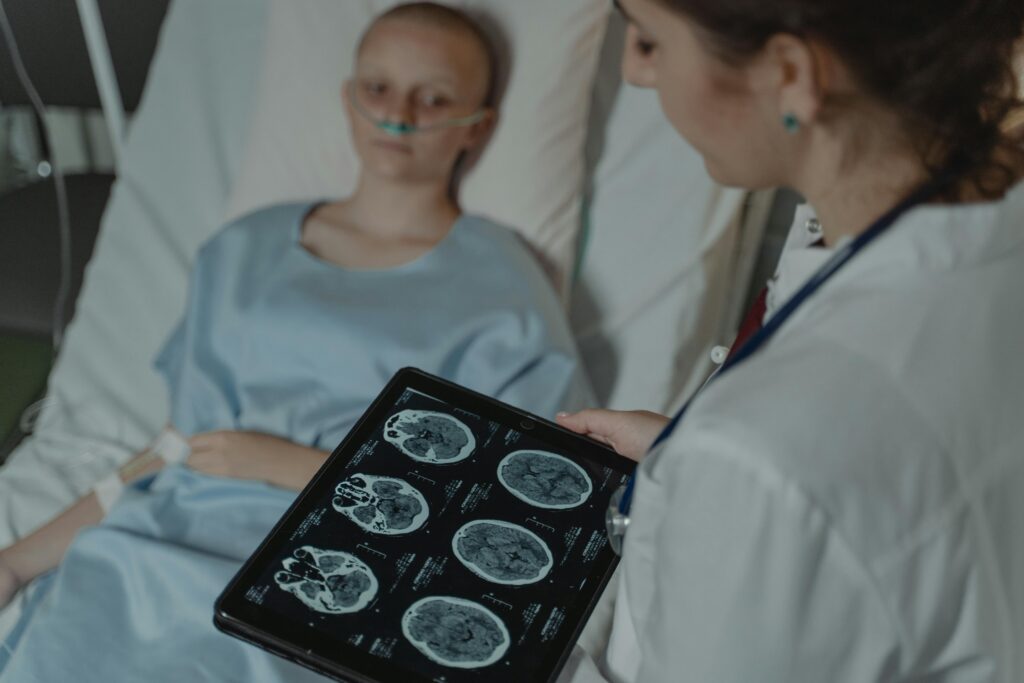Family members often play a crucial role in providing help and support during chemotherapy. However, the process can also take a toll on your loved ones—especially caregivers, spouses, and children. Here’s what you need to know to help your family and friends prepare for the journey ahead.
How Can My Treatment and Its Side Effects Affect My Family?
While cancer isn’t contagious, its impact extends to everyone in your support circle. During chemotherapy, you’ll have good days where the company of loved ones is uplifting, and challenging days where you’ll need rest and solitude to recharge.
Family and friends often want to help but may not know how. Preparing in advance can make their support more effective and your experience more manageable.

- Ask for Specific Help: Consider what would be most helpful—whether it’s preparing simple, healthy meals, accompanying you to appointments, or providing transportation to the treatment center.
- Be Open About Your Needs: Don’t hesitate to ask for assistance. Most loved ones are eager to support you and just need guidance on how best to help.

Are There Health or Safety Concerns for the Family?
Chemotherapy can make you more susceptible to infections, so it’s important for family members to take extra precautions to protect your health. While the risk is manageable, maintaining a clean and safe environment is essential.

General Health Precautions
- Hand Hygiene: Encourage frequent handwashing with soap and water. Keep hand sanitizer readily available.
- Cleanliness: Disinfect household surfaces regularly and take extra care in food preparation.
- Shoes Off: Ask guests to remove their shoes before entering your home to minimize germs.
- Illness: If a family member becomes sick, avoid close contact until they recover.
Safety During and After Chemotherapy
Certain chemotherapy drugs may require additional steps to protect family members and pets from exposure to residual medication in bodily fluids.
Your body will eliminate most chemotherapy drugs within 48 hours after treatment, and these may be present in urine, tears, vomit, or blood. Exposure to these fluids can cause skin irritation. Here are some safety tips, as recommended by the American Cancer Society (ACS):
- Toilet Use: Always close the toilet lid before flushing and flush twice after each use. If possible, use a separate bathroom from family members.
- Handwashing: Wash hands thoroughly after using the bathroom or coming into contact with bodily fluids.
- Cleaning Bodily Fluids: Caregivers should wear two pairs of disposable gloves when cleaning up bodily fluids. If exposed, wash the area thoroughly to prevent irritation.
- Laundry: Wash soiled sheets, towels, and clothes immediately in a separate load. If immediate washing isn’t possible, store items in a plastic bag until ready to clean.
- Trash Disposal: Dispose of soiled throwaway items in two plastic bags before placing them in the trash.
Intimacy Precautions
Both men and women undergoing chemotherapy should consider using condoms during intercourse to prevent exposure to residual drugs. This precaution is recommended for the duration of treatment and up to two weeks afterward.
By following these steps, you can minimize health risks for your family while undergoing chemotherapy.
Managing Relationships During Chemotherapy
Chemotherapy can shift family dynamics as loved ones take on caregiving roles and new responsibilities. Social activities and routines may take a backseat, leaving family members feeling stressed or overwhelmed.
It’s important to support caregivers and loved ones, especially children, as they navigate these changes. Encourage open communication, acknowledge their efforts, and seek additional support if needed. Providing reassurance and fostering patience can help maintain strong relationships during this challenging time.
Communication Is Key
Open communication is essential, especially with those closest to you. If speaking verbally feels difficult, consider writing a letter, sending an email, or using other creative methods to express your thoughts.
Some people find it helpful to share updates about their treatment through a blog or a private social media group. This allows you to keep loved ones informed without the need to update each person individually, especially on days when you’re not feeling well enough for calls or visits.
If social media isn’t your preference, explore alternative ways to stay connected. Let your loved ones know what you need—whether it’s extra help, emotional support, or simply some time for yourself—gently and clearly.
Coping with Cultural and Interpersonal Dynamics During Chemotherapy
Everyone’s experience with cancer and its treatment is unique, shaped by personality, cultural, and religious beliefs. Some may prefer to surround themselves with loved ones, while others might choose solitude.
Your family will also process the challenges of cancer differently. Emotions like fear, anxiety, and even anger can surface, and at times, you might feel overshadowed in family decision-making about your care.

Finding Support
- Family Discussions: Sit down with loved ones to address these dynamics openly and honestly.
- Peer Connections: Consider talking with others outside your household, such as people currently undergoing chemotherapy or cancer survivors.
- Support Groups: Many hospitals and online communities provide support groups for patients, caregivers, and family members. These spaces offer encouragement, shared experiences, and practical advice.
- One-on-One Programs: Explore programs that pair you with a survivor for personalized guidance and support throughout treatment.
By addressing interpersonal and cultural dynamics, you can create a supportive environment that respects everyone’s perspectives while prioritizing your needs.
How to Care for Your Children During Chemotherapy
Undergoing cancer treatment while raising children can be especially challenging. You may worry about how your diagnosis and its side effects will affect your kids and wonder how much to share with them.
Communicating with Your Children: The American Cancer Society (ACS) recommends sharing the basics with children of all ages:
- The type of cancer you have.
- Where it’s located in your body.
- What your treatment will involve.
- How it may impact your daily lives.
Younger children may not need as many details as older ones, but all kids will sense that something is different, even if you don’t tell them. Being honest and age-appropriate helps them feel included and secure.

Seeking Childcare Support: Caring for children is demanding on the best of days and becomes even harder when you’re dealing with treatment-related fatigue, anxiety, or other side effects. Consider ways to share childcare responsibilities:
- Ask for Help: Reach out to family, friends, or trusted community members for support with daily tasks.
- Professional Resources: Speak with your doctors, nurses, social workers, or psychologists. They can connect you with childcare resources and services, especially if you’re a single parent.
By addressing your children’s needs with honesty and seeking support when necessary, you can navigate this journey while maintaining a sense of stability for your family.






